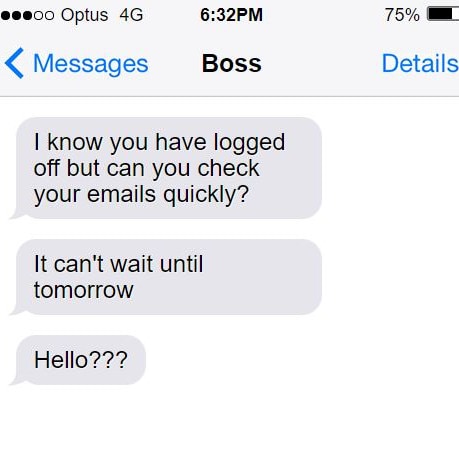Truth about proposed ‘right to disconnect’ law that too many Aussies are ignoring
One particular group of Aussies appear to be very upset with a plan to allow workers to ignore boss’ calls – but there’s a truth they just won’t admit.
At Work
Don't miss out on the headlines from At Work. Followed categories will be added to My News.
A law allowing Aussies the right to ignore their bosses calls, texts and emails outside of work hours could soon be implemented across the country.
The “right to disconnect” has been included as an amendment in the Federal Government’s Closing Loopholes Bill, with the change designed to protect employees who refuse to take unreasonable work calls or answer emails in their unpaid personal time.
The idea of not having to feel pressured to answer your boss’ 6pm call or worry you will be penalised if you don’t immediately reply to the dozens of emails rolling in after you clock off sounds ideal, right?
Well, not every Australian agrees, with many people in one generation in particular seeming to be vehemently opposed to the change.
A quick look on social media will show a significant number of people in the Baby Boomer generation slamming the proposed laws.
While they are not the only Aussies voicing their concerns with the changes, they appear more likely to be against the changes than younger workers.
Accusations of younger workers being “lazy” are being thrown around, along with claims the changes will make it even more difficult for businesses to run properly.
One older Aussie even went as far as to brand the proposed legislation “disgusting”.

“Why would you bother having a business and employing people. Too many rules too much unionism, too many lazy workers who want money for nothing. May as well work solo,” one social media user said.
Another claimed the changes showed Australia was “on the road to ruin”, adding they were “making it more difficult for small businesses to employ people. Get rid of this dangerous clown show”.
Another claimed that the laws were unnecessary because “your boss can only annoy you after hours if you let them”.
This was a sentiment echoed by 74-year-old Flight Centre chief executive Graham Turner.
“From our point of view I can’t see why people can’t disconnect if they want to anyway. All they have to do is switch your phone off or switch your laptop off,” he told The Australian Business Network, adding that the proposed changes were “overkill”.
“I suppose it depends on what your position is. If you’re a senior executive you have to accept calls and you certainly would not get a promotion to that sort of level if you didn’t,” he said. “My gut feeling is that it’s a total over-reaction on something that’s not an issue.”
They do have one thing right. When Baby Boomers were entering the workforce and working their way up the ranks, there was no need for right to disconnect laws.
This is because once they were home, there wasn’t anything to “disconnect” from.
Chris F. Wright, Associate Professor of Work and Organisational Studies, University of Sydney, told news.com.au that the advancement in technology, while having many positive impacts, has also allowed the lines to be blurred between home and work life.
“Workers effectively had the right to disconnect when there were pretty rigid boundaries between work life and personal life,” he said.
“The rise of new technology, and especially the smartphone, has really busted those boundaries wide open.
“Smartphones mean we can be getting emails at all hours, at the dinner table, when you are out or whenever. This didn’t used to happen. I guess people might have had pagers once upon a time, but the smartphone really was a game changer.”
Prof Wright said that as society changes, it is necessary for the laws that regulate work practices to change in response.
A 2022 report by the Centre for Future Work found 71 per cent of people surveyed had performed work outside their scheduled working hours, with many doing so in order to meet employer expectations.

Prof Wright noted that this can having significant impacts on employees’ mental health and wellbeing.
“And that’s contributing to things like increased turnover, which is a big underlying factor for a lot of these staff shortages that have been reported across the workforce,” he said.
“That is the impact of the creep of technology into people’s personal lives. It’s enabled us to work more flexibly, which has got some benefits of course, but there is also evidence to suggest that it’s impacted negatively upon workers productivity and on the staff retention.
And those are things that are bad for employers.
“So I think if we’re looking at this from a national economy perspective, these have had negative consequences. And I think that putting in place a regulation to simply provide guidelines around what’s acceptable and what’s not acceptable is going to be good for the country as a whole.”
However, there are still some questions about how the right to disconnect laws, if approved, will play out across Aussie workplaces.
Sally Moten, partner in workplace relations and safety at Lander & Rogers, believes there is a “legitimate question” as to whether the changes are necessary.
“There are already WHS laws in place to protect employees if employers are making unreasonable demands of employees,” she told news.com.au.
“This new legal right to disconnect and associated dispute framework has the potential to create more disputes and increase litigation between employers and employees.”
Ms Moten said that the days of every employee wanting to work 9am-5pm are “long gone” and the time an employee logs off and is unavailable should be able to be determined through discussions with their employer.
“This is a hot issue with very strong views on both sides and we are yet to see the final legislation,” she said.
“It was pleasing to see the developments this week where the government moved away from a model that penalised employers for contacting employees after hours.
“While there will be conflicting views on whether these laws are strictly necessary, the change to allow employees to refuse that contact is a more sensible approach.”
More Coverage
Originally published as Truth about proposed ‘right to disconnect’ law that too many Aussies are ignoring





